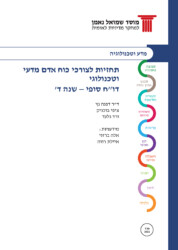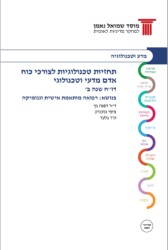This study was conducted as part of a four-year tender for the National Council for Research and Development in the Ministry of Science and Technology. The objective of this study is to forecasts the needs of scientific and technological personnel for selected fields/professions for the short term (10 years).
The past two decades have been characterized by accelerated growth of new technologies in the fields of robotics, communications and information systems, nanotechnology, biotechnology, energy and more. Technologies that affect all areas of the economy (health, education, industry, agriculture, trade, etc.) and dictate new work patterns, new professions while others disappear and appropriate training and skills. In the business sector in Israel, there is often a claim of a shortage of manpower in various fields (cyber, computers, electricity, water, energy, environment, construction, infrastructure, etc.). of the Israeli government need to examine whether technological/vocational education and academic education supply suitable manpower to meet market needs. The formulation of a long-term science and technology policy is an important task, based on analyzing the development trends of various technological fields over time, understanding the potential contribution of science and technology to the economy and society, and identifying barriers that hinder possible developments (IDC, 2001).
Each year of the project, two topics were selected for in-depth research:
First-year: agro tech and photonics; Second-year: 3D printing and personalized medicine and genomics; Third-year: Energy storage and smart cities;
In each of the topics, projections for scientific and technological manpower needs were made over the next decade to help guide and prioritize investments in manpower training in science and technology in these fields.
In the fourth year of research, we will do integrative work on scientific and technological personnel needs in the areas we focused on in the three years of the project and on other technologies/fields identified as future technologies in other projects that have been conducted at SNI.
We hope that this work will help to understand and widen the knowledge of future needs for scientific and technological manpower. And will guide and help the decision-makers to prioritize investments in human resources training in required areas.








